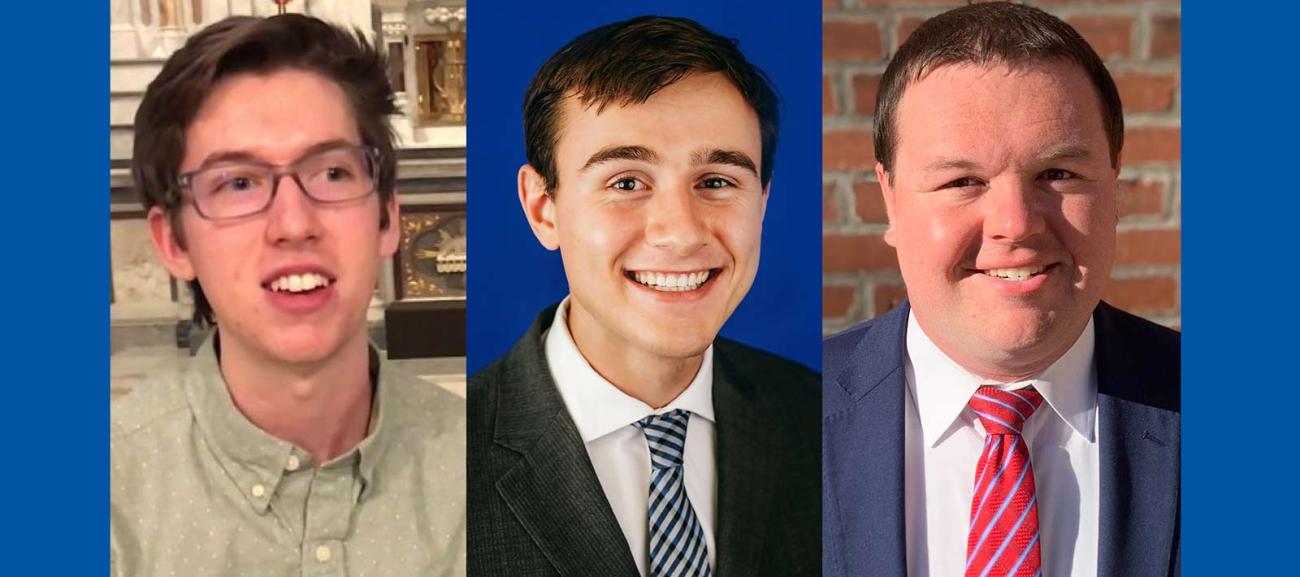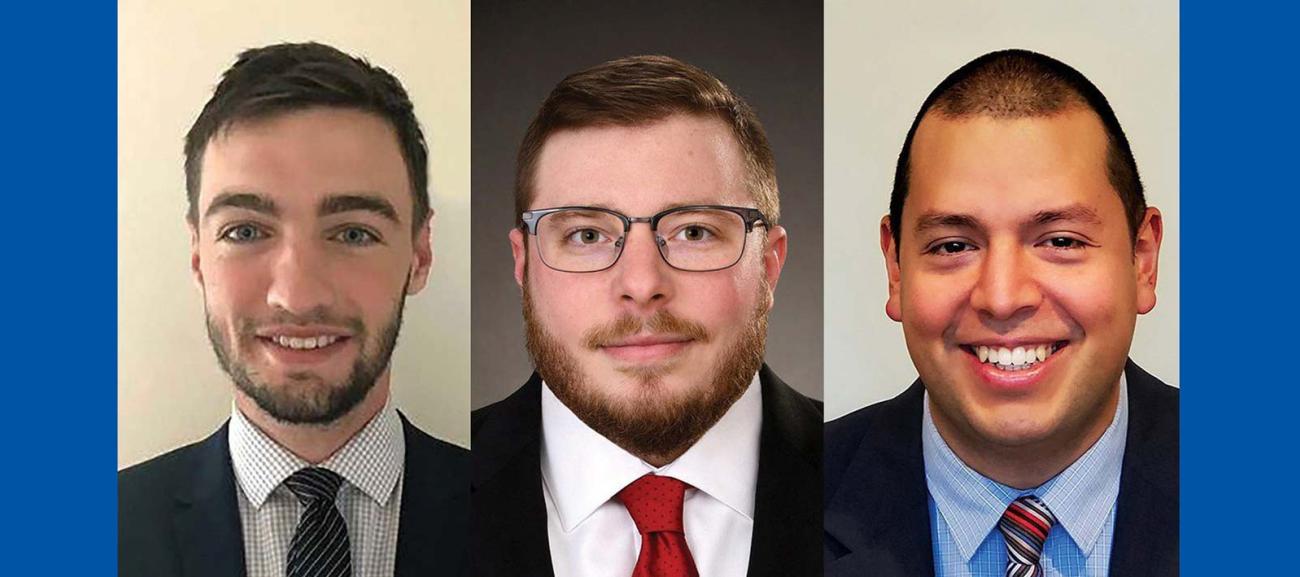
Finding God in all things: Jesuit novices share Creighton connections

For more than a century, Creighton University has been animated by the work of the Society of Jesus. Jesuit priests and brothers worldwide have provided guidance, support and education to hundreds of thousands of students who have been inspired by their contributions and accompaniment, which makes it a praiseworthy occasion when students decide to follow in their footsteps.
On Aug. 19, Jon Herrington, BA’23, from Davenport, Iowa; Taylr Bahr, BSBA’22, from Burlington, Kansas; and Chris Kinkor, BSBA’16, of West Des Moines, Iowa, will enter the Society of Jesus. As novices, the recent Creighton graduates will spend the next two years engaged in study, prayer and service, otherwise known as the novitiate, each with the goal of becoming Jesuit priests.
A process often lasting more than a decade, a Jesuit’s formation also includes “first studies,” “regency,” “theology studies” and “tertianship.” However, the two-year novitiate sets the stage for what the rest of that experience will look like.
“The novitiate experience emulates important moments in the life of St. Ignatius, ‘experiments’ that test, and try, and pry at one’s heart,” says the Rev. Daniel S. Hendrickson, SJ, PhD, president of Creighton University. “The Spiritual Exercises, hospital work, a pilgrimage and a temporary assignment to ministry within a different Jesuit community facilitate important interactions and engagements of their own, and each and all help inform the daily question of a Jesuit’s life, that of finding God in all things.”

Bahr, Herrington and Kinkor join a long history of Creighton connections who have gone on to enter the Society of Jesus. The Rev. Eric Immel, SJ, vocation promoter for the Midwest Jesuits and former Creighton Greek life assistant director, says that Creighton students, alumni, former staff and others in the University community represent 24 entrants, known as vocations, into the Society of Jesus in the last 20 years.
“It is a significant contribution,” he says. “I think it all starts with the richness of Creighton’s mission.”
Of these two dozen vocations over the last two decades, three are novices with Creighton ties who will complete their novitiate one week prior, on Aug. 12. While not all graduates of Creighton, Ben Rogers, nSJ, BSBA’18; Ryan Cruise, nSJ; and Carl Caceres, nSJ, point to their time on campus as a transformational one. Rogers came from Sioux Falls, South Dakota to be a member of the Creighton golf team; Cruise is a Bettendorf, Iowa, native who attended Creighton for a year before his first attempt at completing the novitiate; and Caceres served as the director of McGloin residence hall from 2018 to 2019.
A Formative Community
So, what is it about Creighton that has inspired so many to enter the Society of Jesus?
“There’s a sense of community and you feel connected to the students and to the teachers; I had personal relationships with many of my professors, so that was a special interaction,” Rogers says. “And Jesuit dinners, going over to the community for meals and Mass was very influential and impactful for me.”
“I met a lot of really cool people, a lot of fantastic Jesuits and people who really nurtured me to be myself,” says Herrington, who served as a student worker for Creighton Campus Ministry. “It was in front of Creighton Hall, on those rocking chairs, that I told one of them, ‘I want to do what you do.’ He got me connected with the Society and the rest is history.”
What stands out in talking to those either completing or entering their novitiate is that every person said they found mentors in the Jesuit community at Creighton. The Rev. Larry Gillick, SJ, to the Rev. Lorn Snow, SJ, to the Rev. Michael Flecky, SJ, and more, each had a personal story of the Creighton Jesuit community being there for them. In Kinkor’s case, that included many years after his graduation.
“At my time at Creighton, I definitely grew in my faith but as I was approaching graduation I was like, ‘I want to get a job and make money and live my own life,’” Kinkor says. “Fast forward … and I reached out to one of my friends who was the former associate pastor at St. John’s, Father Paddy Gilger, SJ, BA’02. Things were objectively going pretty well, but I was getting the feeling that this wasn’t necessarily what I was put on this Earth to do. We ended up talking about where those feelings were coming from and when I was looking at the possibility of what Jesuit life would have to offer, it continued to give me more and more peace.”
Bluejays, Always
Those entering the novitiate this August know that community will be key to their next two years. Having a head start through their shared Creighton ties will only make those connections stronger.
“The Jesuit formation is really designed to expand your horizons in a way that you might not be able to imagine for yourself,” Herrington says. “To grow alongside our classmates with a superior (head of a Jesuit community) in a life that is dedicated to your own human flourishing.”
For those completing their novitiate, they say the biggest lesson is to trust the process and people around them.
“The novitiate tests you; you get tested and stretched in a variety of different ways,” Cruise says. “I think about some of the older Jesuits still in formation whom I really admire and it’s consoling to know that formation will work, and I will someday be like the men I admire.”
“It makes the whole novitiate experience smoother when you have your brothers who are with you,” Caceres says. “Most of the things we are doing, we are doing together and to have that great spirit among us has been tremendously helpful.”
Though they may be separated by years, or in some cases decades, these six men are poised to continue the same journey as those who helped build Creighton University.
“There’s a lot of pride in being a Bluejay,” Bahr says.
“My heart and soul are with Creighton,” Rogers agrees. “It’s a very special place.”
Bahr, Herrington and Kinkor will soon head to St. Paul, Minnesota, to begin their journey, while Cruise, Rogers and Caceres will be taking their next step and entering graduate programs to begin three years of theological and philosophical studies. Yet, while their respective journeys will undoubtedly take them to countless places around the world, Creighton University will continue to serve as a home – and community – to which they can always return.
Novice to Novice
This August, three recent Creighton alumni will be taking the first step on their journey to becoming Jesuit priests. For Jon Herrington, BA’23; Taylr Bahr, BSBA’22; and Chris Kinkor, BSBA’16, there is a lot they know but a lot more they still have questions about regarding the novitiate process. Luckily, three other men with Creighton ties, Ben Rogers, BSBA’18, Ryan Cruise and Carl Caceres are preparing to complete their two-year novitiate and can provide some novice-to-novice advice.

Herrington, Bahr and Kinkor were each asked what questions they would pose to someone transitioning from the novitiate to first studies. Paraphrased, collective responses from Rogers, Cruise and Caceres appear below:
Is there any general advice you would give to those just beginning their formation?
In general, the novitiate is a time for prayer. Be faithful in that prayer, have patience and trust that the Society cares for you and wants success for you.
If you give yourself over to your experiments (experiences of service, ministry and Jesuit community life), they can be truly rewarding. They may not make sense while you are doing them, but retrospectively they were foundational.
Trust your spiritual directors and be honest with them. And then also lean into community; this is a group effort. We do things together and we can learn so much from each other.
What is one thing you wish you had done differently?
To be more patient. You don’t have to force things or be someone you are not. Be comfortable in how you arrive at the novitiate. You are not going to arrive as a saint or fully formed and be comfortable in that. Be present in the moment. Focus on what you’re doing now.
It's so easy to look ahead because of the structure. Remaining in the present is really important. You can't really plan where you're going to be missioned and where exactly you're going to go.
What surprised you the most?
How close and how tight of a bond that I would have with my novitiate classmates. I knew just from my previous relationship with the Jesuits that I really gravitated toward their kind of spirituality and their way of being. A hallmark characteristic of our community, I would say, is laughter and joy, and that might not be the first thing that people think about when entering religious life.
I think the thing that surprised me was that, as I look back on these two years, it was the times where I was going through maybe the darkest moments or the toughest times or I felt alone or in desolation and how I am so thankful for those, because that's where I grew the most in my love for God and for the Society.
What have you appreciated the most?
Our formation staff; they are just men who are selfless, humble, committed to the Lord, committed to the Church, and are incredible role models for us. And so, we are deeply, deeply indebted and appreciative of those men.
Also, the way the Society takes care of us. We (three) were recently at Loyola University of Chicago taking a history course and Jesuits are flying in from all over the country just to give us a talk on their history specialty and it's really moving and consoling to know that the Society cares enough about us to coordinate that and bring everything together.
What aspect has been the most challenging?
The fast-paced novitiate travel schedule can put a mental strain on you at times. Month after month you're moving, and it’s just the awareness that you’re going to move, you know, every three to six years probably for the rest of your life. It can be tough at times to not have a home.
You're also joining a religious order, which means you're taking a vow of obedience and you're going to lose a little bit of your autonomy. So, you're going to lose some of your ability to make decisions to move freely too. We all had that experience of having a lot of autonomy in our lives and it certainly is a transition. That can be challenging at times, but it's very important, in those moments when you're feeling stretched by obedience, to understand that God works through our superiors.
















